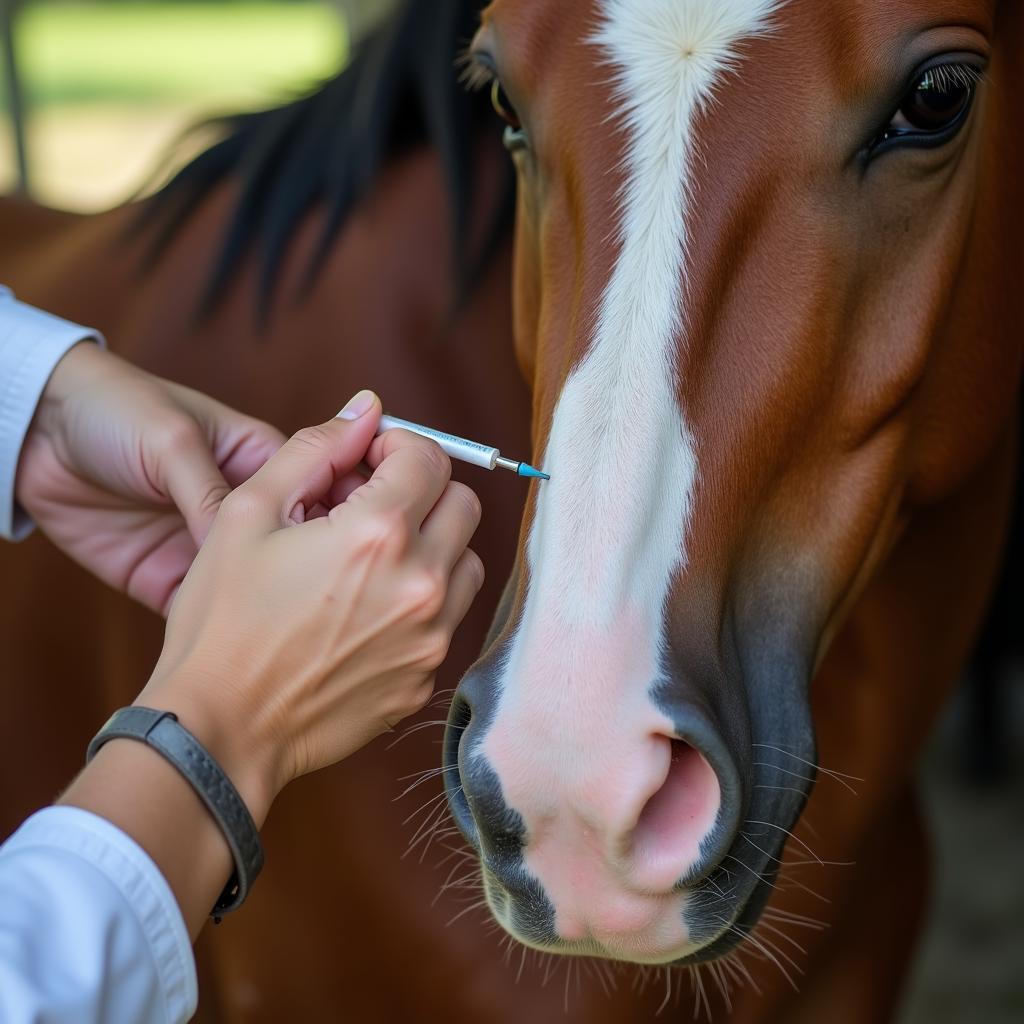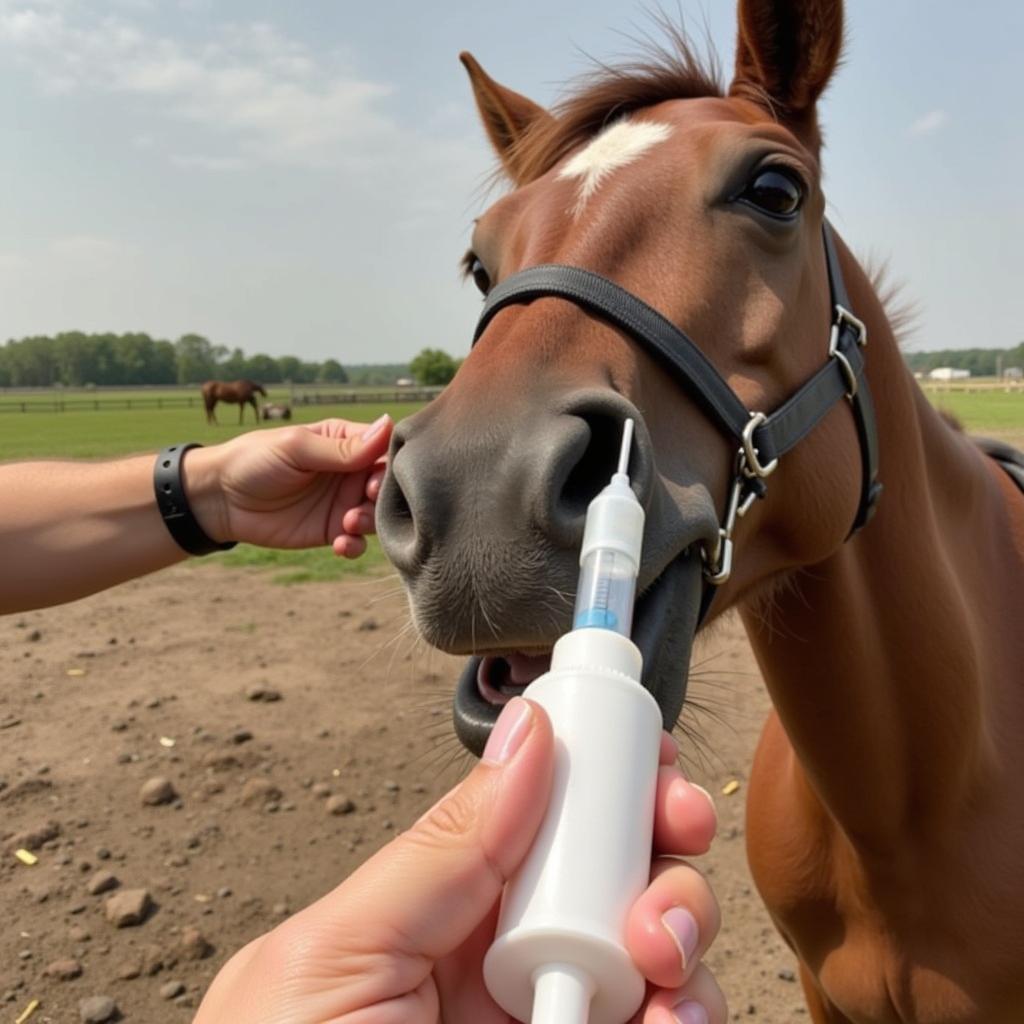Methocarbamol is a commonly prescribed muscle relaxant for horses, often used to manage conditions causing muscle spasms, pain, and tension. While generally safe and effective, administering the correct Methocarbamol Horses Dosage is crucial for optimal results and to prevent potential side effects.
Understanding why your veterinarian prescribed methocarbamol, the recommended dosage, and potential side effects is essential for horse owners. This comprehensive guide will cover everything you need to know about using methocarbamol for horses safely and effectively.
What is Methocarbamol and How Does it Work in Horses?
Methocarbamol is a central nervous system depressant that works by blocking nerve impulses traveling to the brain, reducing muscle spasms and pain. It is often used in conjunction with other therapies to treat a variety of conditions in horses, including:
- Muscle spasms: Methocarbamol is often used to treat muscle spasms caused by injuries, such as strains, sprains, or back pain.
- Tetanus: This serious bacterial infection can cause severe muscle stiffness and spasms, which methocarbamol can help manage.
- Seizures: In some cases, methocarbamol might be used to control seizures in horses, although it is not a primary treatment option.
- Pre- and Post-Surgery: Veterinarians may administer methocarbamol before or after surgical procedures to relax muscles and facilitate a smoother recovery.
 Methocarbamol for Horses
Methocarbamol for Horses
Understanding Methocarbamol Dosage for Horses
Determining the appropriate methocarbamol dosage for your horse depends on several factors, including:
- Weight: The most critical factor is your horse’s weight, as dosage is calculated based on milligrams per pound of body weight.
- Condition Severity: The severity of the condition being treated will influence the dosage.
- Administration Route: Methocarbamol is available in both injectable and oral forms, with each method having a different absorption rate and dosage recommendation.
- Individual Response: Horses may respond differently to medications, and adjustments might be necessary based on your horse’s individual reaction.
It is crucial to consult your veterinarian to determine the appropriate methocarbamol dosage for your horse. Never attempt to self-medicate your horse, as incorrect dosage can lead to adverse effects.
Administering Methocarbamol to Horses
Methocarbamol is typically given intravenously (IV) by a veterinarian, particularly for immediate relief from severe muscle spasms. Oral administration, often in the form of a paste or powder, is suitable for long-term management or less severe cases.
When administering oral methocarbamol, it is essential to:
- Follow your veterinarian’s instructions carefully.
- Use an accurate dosing syringe or measure the powder precisely.
- Mix the medication with a palatable treat, such as applesauce or molasses, to encourage consumption.
- Ensure your horse consumes the entire dose.
 Administering Oral Methocarbamol
Administering Oral Methocarbamol
Potential Side Effects of Methocarbamol in Horses
Methocarbamol is generally considered safe for horses when administered correctly. However, like any medication, potential side effects might occur, including:
- Sedation: Drowsiness is a common side effect of methocarbamol, especially at higher doses.
- Loss of Coordination: In some cases, methocarbamol can cause ataxia or incoordination.
- Low Blood Pressure: IV administration might lead to a temporary drop in blood pressure.
- Allergic Reactions: Although rare, allergic reactions can occur and require immediate veterinary attention.
Contact your veterinarian immediately if you notice any unusual symptoms or side effects after administering methocarbamol to your horse.
Precautions and Considerations
- Pregnant or Lactating Mares: The safety of methocarbamol for pregnant or lactating mares has not been fully established. Consult your veterinarian before administering this medication to pregnant or nursing horses.
- Drug Interactions: Methocarbamol can interact with other medications, including sedatives and tranquilizers. Inform your veterinarian about all medications and supplements your horse is currently receiving.
- Withdrawal Time: If your horse is involved in competitive events, discuss the withdrawal time for methocarbamol with your veterinarian to ensure compliance with competition rules.
FAQs about Methocarbamol Dosage for Horses
1. What happens if I miss a dose of methocarbamol?
If you miss a dose, administer it as soon as you remember. However, if it is close to the next scheduled dose, skip the missed dose and continue with the regular dosing schedule. Do not double dose to compensate for a missed dose.
2. Can methocarbamol be used long-term in horses?
Methocarbamol can be used long-term under the guidance of a veterinarian. Regular monitoring for side effects and adjustments to the dosage may be necessary during prolonged use.
3. How long does it take for methocarbamol to work in horses?
The onset of action for methocarbamol varies depending on the administration route. IV administration provides almost immediate effects, while oral administration may take 1-2 hours to reach peak effectiveness.
 Veterinarian Examining a Horse
Veterinarian Examining a Horse
Need More Information?
Understanding the appropriate horse muscle relaxant and its dosage is crucial for your horse’s well-being. If you have any further questions about horse muscle relaxer or need personalized advice regarding your horse’s specific needs, please don’t hesitate to contact us.
For immediate assistance, call us at 0772127271, email us at [email protected], or visit our facility at QGM2+WX2, Vị Trung, Vị Thuỷ, Hậu Giang, Việt Nam. Our dedicated team is available 24/7 to provide exceptional care and support for your equine companion.